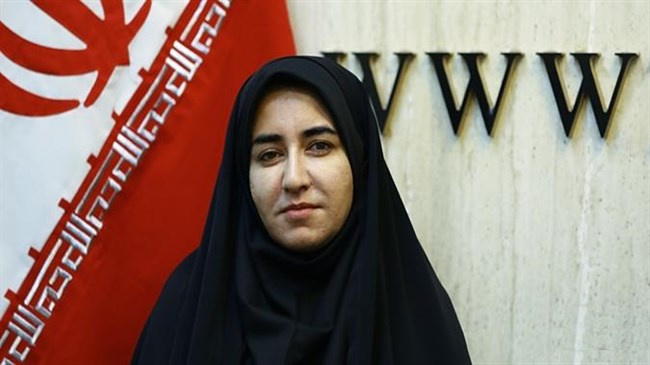MP: Iran should strengthen diplomacy with neighbors to confront sanctions

ICANA
By Sadeq Dehqan & Farzam Vanaki
Iran is required to focus on strengthening its diplomacy with neighboring states in political, military and economic sectors as a strategy to confront the US persistent sanctions policy, said an MP.
Speaking in an exclusive interview with Iran Daily, Sara Fallahi, a member of the Iranian Parliament's National Security and Foreign Policy Committee, stressed that the Islamic Republic should form new cooperation councils with its neighbors.
When established on a regional level, she added, such councils can back their members in international organizations and help them secure a larger number of votes.
The MP said Iran is currently a member of the Economic Cooperation Organization (ECO), regretting that the organization, however, is yet to play an active role in the process of achieving its goals.
“We have failed to define and promote our common interests correctly within the framework of such collaborations.”
The ECO is an intergovernmental regional organization, encompassing countries from Europe, Caucasus and Central Asia, Middle East and South Asia with more than 460 million inhabitants, according to eco.int.
Covering an area of over eight million square kilometers, it connects Russia to the Persian Gulf and China to Europe. The overall objective of the organization is the sustainable economic development of its member states and the region as a whole.
Established as Regional Cooperation for Development (RCD) in 1964 by Iran, Pakistan and Turkey, the organization was rechristened as ECO in 1985.
In 1992 and in the aftermath of the collapse of the Soviet Union, Afghanistan and six former Soviet republics, namely, Azerbaijan, Kazakhstan, Kyrgyzstan, Tajikistan, Turkmenistan and Uzbekistan joined the organization, forming one of the biggest regional blocs in Asia and beyond with 10 members.
Fallahi said, “Our weakness in defining common interests among neighbors and promoting regional cooperation has caused major powers, including the US, to be able to extend their influence over the region and implement their policies through sowing discord among its states.”
She underlined that Iran is not the only country in the region that should strengthen its neighborly diplomacy, calling on all regional states to come to a mutual understanding in this regard and prioritize regional interests in their foreign policies.
“Under the present circumstances where Iran has beentargeted by the hostile polices of the enemies wielding influence over important international organizations, some of our neighbors are working against us taking sides with our enemies. We are required to assume command over the operations and persuade the neighbors to define their common interests and increase their political and economic interactions and exchanges with each other.”
Emphasizing the importance of greater unity between the Iranian Parliament and government, she called on the two branches of government to adopt a unified strategy in different fields.
Urging greater solidarity among the country’s political elites, the MP also warned that any discord in the country will politically feed the enemies’ propaganda against Iran.
At a time when the enemies seek to form a global consensus against Iran, discord among domestic sectors can be the best news for them, she added.
Fallahi said the Iranian Foreign Ministry plays a very significant role in foiling the enemies’ plots, adding Tehran’s more active role in the field of foreign policy and increased interaction with the world will prevent the enemies from deceiving the international community into believing the lie that Iran is a security threat.
She noted that domestic media play a very significant role in this field, saying, “We should be transparent in a way to be able to convince the international community and emerge victorious from the enemies’ political and media games.”
Commenting on the political and economic challenges faced currently by the US, Fallahi said with only a few months to the end of US President Donald Trump’s term in office, the situation is not unfolding in his favor.
“The ground is not prepared for his victory in the next presidential election.”
Americans are not in a good economic condition, incapable of envisaging a bright future for the country, the MP noted, saying in addition, Europe is not counting on US investments to the extent it used to when the country was in its heydays.
She described as tumultuous the situation inside the US in the aftermath of the killing of George Floyd, an African American man, by US police in May.
The tragic incident has led to massive protests, first started in Minneapolis in the US in late May, across the world. The rallies in the US have been against the Trump administration’s racist policies and the police’s inhumane behavior.
Fallahi added this comes as, the policies Trump claimed to be willing to adoptat the beginning of his tenure, implied that he seeks to shift focus from expanding military presence in remote areas to boosting domestic economy to overcome the economic challenges faced by the US.
She said the US, however, has failed to solve its economic challenges.
The lawmaker noted that the US has placed Iran under pressure to change the Islamic Republic’s political behavior and to this end, reimposed, and then intensified, its strict sanctions on the country.
In May 2018, Trump pulled the US out of the Joint Comprehensive Plan of Action, signed between Iran and the P5+1 in July 2015, and reimposed Washington’s unilateral sanctions on Tehran as part of the White House’s “maximum pressure” campaign against the Islamic Republic.
This comes as with the next US presidential election due to be held in November, Washington’s “maximum pressure” campaign and unilateral sanctions against Tehran have failed to produce the Trump administration’s desired results, namely changing Iran’s political behavior and signing a new nuclear deal with the Islamic Republic.

